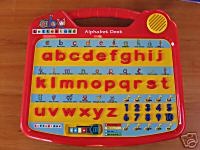From Wednesday, November 08, 2006
Lyddie brought me one of her new books to read to her last night – the ones from ex-stepdad and his new, retired-teacher wife. A bit of background first. He visited one day when I was sewing a letter d in dotty fabric. The conversation went as follows:
Ex-stepdad: What are you sewing?
Me: A letter d, with dotty fabric, look.
Ex-stepdad: But why?
Me: To help Lyddie learn to read.
Ex-stepdad: And how do you know that’s the best way of teaching her?
Me: I’m not teaching her, I’m helping her to learn. Basically, there are two main methods: Look-say and phonics. I used to think look-say was the best way. It involves the reader learning to recognise whole words just by being repeatedly told what the word says. It’s how most children in schools have learned to read since about the 1960s. But I’ve been doing some research and I now think phonics is the better system. The child learns letter sounds and is therefore able to decode language, making him or her a more independent learner. You would have learned the phonics way, I should think, Dad, whereas I wouldn’t have. [I went on to explain the letter-stitching idea to him.]
Ex-stepdad: Well you know C was a teacher for 40 years, don’t you? I’ll ask her advice for you. Don’t do anything else until she phones you!
Me: Er… why not?
Ex-stepdad: Because she’ll know what to do for the best.
Me: * Laughs uneasily and changes subject *
Then came the phone call from his new wife (retired teacher).
C: Gill, Dad’s told me about the reading thing and I’ve just called to say don’t worry!
Me: Well I’m not worrying, we were just stitching some letters.
C: Well it’s ok, you don’t have to do that any more. Stop right now. I’m going to WHSmiths for you tomorrow. They’ll have some proper books to teach her how to read. I know you can’t afford them, so we’ll buy them, but don’t worry about stitching letters.
Me: Well I’ve opted for the phonics method. I’m sure you know all about that..
C: Yes yes, I was a teacher for 40 years, I can remember what we learned in teacher training college, don’t worry, I’ll get the right thing.
Me: Well C, you do know we have thousands of books here, don’t you? Whatever kinds of books they have at WHSmiths, I’m sure to already have something the same or very similar.
C: Listen, we want to do this, it’s the least we can do. And you’re not a teacher, so you can’t possibly know what's best.
Me: Oh. I see.
C: I know you’re trying to do the best you can but really, stop stitching these silly letters. I’ll get the books to you as soon as possible.
Me: Please don’t spend any money on this…
C: Don’t be silly. We can afford it.
Me: *Thinking: send us the cash then instead! We’ll go to Rievaulx Abbey!* Oh well, if you say so.
The books came at the weekend and my heart sank when I saw what they were. I stuffed them in a corner somewhere in the hope Lyddie would forget about them because I was dreading reading one to her, but last night she absolutely insisted we read one. I needn’t have worried. She laughed until she cried, we both did. We could not believe such a ‘story’ existed. After the first page I could hardly speak for laughing and she could hardly breathe for laughing. I’ve never seen her laugh so much!
Here’s the text of the book we read. Bear in mind this is the 14th book in the series, so the poor mites for whom this is their only source of literary material will have read 13 other such profundities before getting to this one, which is a heartbreaking thought in my opinion.
Page 1: I like the dog. You like the dog. You and I like the dog.
Page 2: I like trees. You like trees. You and I like trees.
Page 3: You want toys. I want toys. You and I want toys.
Page 4: You like Peter. I like Peter. You and I like Peter. (It took us nearly ten minutes to get past this page – for some reason she thought it was the funniest one yet.)
Page 5: I like Jane. You like Jane. You and I like Jane.
Page 6: Here are shops. We like shops. We like toy shops.
Page 7: You can fish. I can fish. We can fish.
Page 8: You want fun. I want fun. This is fun.
This tripe went on for another 20 pages. Fun? I can’t bear to type it all out. Lyddie thought it was hilarious that such a mind-numbingly banal head-bangingly excruciatingly boring book could possibly exist. My relatives spent, at a guess, £50+ at WHSmiths on this load of rubbish if not more – the equivalent of a week’s groceries for us. There’s a whole stack of them here.
When we’d finished I said, “Oh dear, that was awful. Let’s find a decent book now.”
She was still giggling and managed to say, “You like books. I like books. You and I like books.”
And she did that for the rest of the evening, talking in 3-word sentence monotones about everything, it had struck her as being so hilarious. She was taking the p*** out of the book. What a wicked sense of humour to have, at four years old! That's ma girl!
On a more serious note though, John Taylor Gatto devotes a chapter of his
Underground History of American Education to the spookily changing nature of children’s reading books. Before compulsory schooling these were interesting and fun, but they have become (quite deliberately, he says) boring and banal. He’s 100% right if this pile of books here from ex-stepdad and C is anything to go by. He thinks this is a deliberate ploy to put children off reading and I can’t think of any other reason under the sun for forcing a child to read so much absolute drivel. It would put anyone off learning to read. It’s barbaric, psychological abuse – if these kinds of books are the only kind a child has access to.
And in yesterday’s Daily Mail was this story:
Reading Trials a ‘Startling Success’
Children who struggle with reading make ‘startling progress’ when they are given intensive one-to-one tuition, Government-backed research has shown.
Six-year olds were able to catch up with classmates more than a year ahead after being helped by specialists trained in Reading Recovery techniques.
Ministers made the back-to-basics approach mandatory in schools this term.
They are now backing and part-funding the £10million research project to test the effectiveness of Reading Recovery, which involves giving struggling pupils intensive tuition for half an hour a day, for four or five months.
As many as 35,000 youngsters every year finish primary school with severe reading difficulties.
Results from the first year of the initiative have already shown dramatic gains.
Specially-trained teachers were placed in inner-city schools around the country including London, Birmingham, Bristol and Liverpool and assigned to help more than 500 six-year olds.
The youngsters were found to have improved at four times the normal rate after around 38 hours of additional tuition. But children who did not get the extra help fell further behind their peers.
Meanwhile, youngsters who benefited from the scheme also showed improved writing skills, behaviour and motivation.
Boys were particularly helped, managing to draw level with girls.
Dr Sue Burroughs-Lange, head researcher, said: “The progress made by children who received Reading Recovery was startling and statistical tests show it to be highly significant.”
Schools minister Lord Adonis said: “With the right teaching and support, virtually every child can become a successful reader after starting primary school. Getting literacy right in the early years is the key to long-term educational success.”
Reading Recovery originated in New Zealand but is expensive, costing £2,000 to £2,500 per child.Please excuse me while I finish spluttering. A £10million research project??? £2,000-£2,500 per child??? Where I come from it’s called good parenting, it’s free of charge and it is positively hindered, if not prevented, by the compulsory school system.
And I’m just about to google Reading Recovery, to see if I can find out what materials they’re using..
Here it is Apparently it’s based on the ideas of someone called Marie Clay. Googling her too.
Here she is. There’s a picture, too. Oh here’s a paper she’s written. Wow, it’s good stuff actually. I won’t quote it all but if you’re interested it’s well worth a read. Some key extracts:
“Independent reading is the reading students choose to do on their own. It reflects the reader’s personal choice of the material to be read as well as the time and place to read it. Independent reading is done for information or for pleasure. No one assigns it; no one requires a report; no one checks on comprehension.”
Yup, this is what my children all did. I would contend that most young children in the constant presence of lots of good books would pick this up naturally, especially if they see their adults reading for pleasure too.
Argh, the whole paper is interesting. I mustn’t quote it all or this blog post will be unfeasibly longer than it’s already going to be. Wow, she quotes this from Jefferson though:
“The basis of our government being the opinion of the people, the very first object should be to keep that right; and were it left to me to decide whether we should have a government without newspapers, or newspapers without a government, I should not hesitate a moment to prefer the latter.”
I wonder if our government has actually read the contents of this £10million project they’re funding? LOL.
But here’s the crunch:
"Research indicates, however, that many students do not choose to read often or in great quantities. In recent years scholars from a variety of disciplines have studied the amount of time students choose to read and the effect of literacy on cognitive functions. In a series of studies involving hundreds of students, Morrow and Weinstein (1986) found that very few preschool and primary grade children chose to look at books during free-choice time at school. Greaney (1980) found that fifth-grade students spent only 5.4 percent of their out-of-school free time engaged in reading, and 23 percent of them chose not to read at all. Anderson, Fielding, and Wilson (1988) found that students spend less than 2 percent of their free time reading. Furthermore, as students get older, the amount of reading they do decreases."
Yes, because they’re in school. And what are they given to read at school? If it’s anything like our new Key Words scheme, they’d be certifiably insane to want to sit and read it.
"The premise that literacy is associated with school achievement, participation in a democracy, and self-fulfilment is widely held. Why then don’t students read more? Some suggest that the way reading is taught is not conducive producing students who love to read. In a study for UNESCO, Irving (1980) found that most respondents made no association whatsoever between reading and pleasure.
"According to Anderson, Fielding, and Wilson (1988), students who begin reading a book in school are more likely to continue to read outside of school than students who do not begin a book in school."
What? I’ve read that last sentence twice and I still don’t get it. How have they measured that?? Ugh, I’m not going to google Messrs Anderson, Fielding, and Wilson too. This could go on all day.
"However, research also suggests that some teachers are not knowledgeable about children’s literature; they are not able to introduce students to the wealth of books available, and they may not recognize the effects of their teaching methods on students’ attitude toward reading (Short and Pierce 1990)."
If this is really the case, what on earth are they being paid for? And what on earth did they learn at teacher training college? It’s like saying some doctors don’t know anything about the immune system. Oh wait, …. Yeah. *rolls eyes*
"The common sense notion that students who do a substantial amount of voluntary reading demonstrate a positive attitude toward reading is upheld in both qualitative and quantitative research [she goes on to list all the research.]"
Well duh. We needed all those experts to tell us that?
"Students’ reading achievement has been shown to correlate with success in school and the amount of independent reading they do (Greaney 1980; Anderson, Fielding and Wilson 1988). This affirms the predictability of a success cycle: we become more proficient at what we practice (Cullinan 1992)."
Oh goodness me. I think I’d rather read about Peter and Jane. More chance of finding out something we didn’t know. Like whether I like a dog or not. So nice to be informed about what I like…
"Overwhelmingly the studies show that children from a variety of socioeconomic backgrounds learn to read early."
Well I never. Even poor children can learn to read.
"Children who learn to read before school entrance (about 1 percent of the population) are those who are read to, who have someone to answer their questions, and who like to make marks on paper. They are called “paper and pencil” kids (Durkin 1966). Studies show clearly that children need not be from privileged homes in order to learn to read early, but they must have access to print and have someone to read to them (Taylor and Dorsey-Gaines 1988). Heath (1982), concluded that the way children interact with books in many homes differs from how they are expected to interact with books in school. Children who come to school with well-developed skills in “taking meaning from books” are clearly at an advantage.
"When Durkin (1966) studied the homes of children who had learned to read early, she found that someone in the home read to the children, answered their questions, and encouraged them to write. Wells (1986) counted literacy events (which he defined as any encounter in which the child was involved in reading, writing, or engaging with print), and found that prior to school entrance some children had hundreds of literacy events, whereas others had few or none. The amount of experience that five-year-old children had with books was directly related to their reading comprehension at seven and eleven years old. Children who had engaged in hundreds of literacy events entered school understanding more about the world than children with minimal literacy events and furthermore, they excelled at the end of elementary school. Six years of schooling could not make up for the loss children suffered by not engaging in literacy events in their early lives. Wells stated that of all the activities considered possibly helpful for the acquisition of literacy, only one—listening to stories—was significantly associated with later test scores. The need for extensive early literacy experience was further documented in the research of Durkin (1966), and Teale and Sulzby (1986, 1992)."
So they know – they know! – that being at home with an active, involved parent is the best possible environment. And still we have compulsory full-time schooling from 5 years old and state encouraged full-time schooling from 2 years old. From 6-weeks old, if SureStart has its way.
There’s more, then:
"Krashen (1989, 1993, 1995a 1995b) conducted a comprehensive meta-analysis of forty-one studies on in-school free reading, sustained silent reading, and self-selected reading programs. In thirty-eight of forty-one studies, students who engaged in free reading did as well or better on standardized tests of reading comprehension than students who were given direct instruction in reading. Krashen’s meta-analysis showed that in-school free reading programs are related to vocabulary development, knowledge of grammar, writing, and oral language facility. Correlations between free voluntary reading and scores on literacy proficiency tests are not always highly significant statistically; however, they are consistent and show that free voluntary reading does make a difference.
"Students’ reading ability and desire to read are affected by the structure of the texts they read. If texts are well organized, have a logical flow, and include relevant information, they are inviting and reader friendly. Unfortunately the quality of writing used in some content-area textbooks found in American classrooms is considered deficient in some respects (Anderson and Armbruster 1984; Armbruster and Gudbrandsen 1984; Flood et al. 1991). Some textbooks are simply “baskets of facts,” little more than loosely connected lists of propositions about a topic. The organization of chapters, the structure of expository text, and the language may be murky. Traditional expository structures such as cause-effect, temporal sequence, or comparison-contrast are seldom found. Students often find more clearly written expository text in good informational trade books than in textbooks (Freeman and Person 1992)."
This is exactly my point. Boring books put a child off reading. So why publish a reading scheme that’s mindnumbingly boring?
Here’s the conclusion of the paper:
"Independent reading is the kind students choose to do on their own; it is not assigned or assessed, but it has a positive effect on learning and school achievement. Research about the effects of independent reading on school achievement and programs planned to promote it demonstrates these common factors:
The amount of free reading done outside of school has consistently been found to relate to achievement in vocabulary, reading comprehension, verbal fluency, and general information. Students’ reading achievement correlates with success in school and the amount of independent reading they do (Anderson, Wilson, and Fielding 1988; Guthrie and Greaney 1991; Krashen 1993; Cunningham and Stanovich 1991; Stanovich and Cunningham 1993).
Numerous surveys show that many students do not choose to read great quantities, nor do they choose to read often (Morrow and Weinstein 1986; Greaney 1980; Anderson, Fielding, and Wilson 1988).
The preschool years are crucial ones for children’s language and literacy development (Baghban 1984; Clay 1991; Durkin 1966; Heath 1983; Ninio and Bruner 1978; Snow 1996).
Library programs are founded on the knowledge that literacy experiences have a lasting effect on language growth, reading development, and scholastic achievement (ALSC 1996; ALA 1996; Bridge and Carney 1994; Towey 1990).
Common features of effective programs designed to promote reading in schools, homes, and libraries include access to varied material that appeals to all ages and tastes, active parent involvement, partnerships among community institutions, and collaboration among significant adults in students’ lives."
So the
Reading Recovery programme, if it’s based on the work of Marie Clay, will introduce interesting things to read to stimulate a love of reading. No wonder it’s so ‘startlingly effective’. But £2,000 to £2,500 per child? Gah.
The state replaces parenthood, forces young children into schools and alienates them from their parents, who are pushed into full-time, taxpaying employment. THEN, when the boring school reading schemes don’t work, (quel surpris,) the government has to spend vast amounts of taxpayers’ money on buying in yet another project which has consulted a dazzling array of Educational Psychologists to work out that what children need is something as close as possible to time at home with engaged parents.
Tell me I’m dreaming? What a mad world.
posted by Gill at 5:28 AM 17 comments
 Just to prove Tim's stereotype theory ^^ here's the image, which you can if you like imagine to be slowly rotating through 180 degrees every 2 millennia or so. You can picture me wearing pink or yellow-lensed shades at the same time also, if it helps!
Just to prove Tim's stereotype theory ^^ here's the image, which you can if you like imagine to be slowly rotating through 180 degrees every 2 millennia or so. You can picture me wearing pink or yellow-lensed shades at the same time also, if it helps! 









